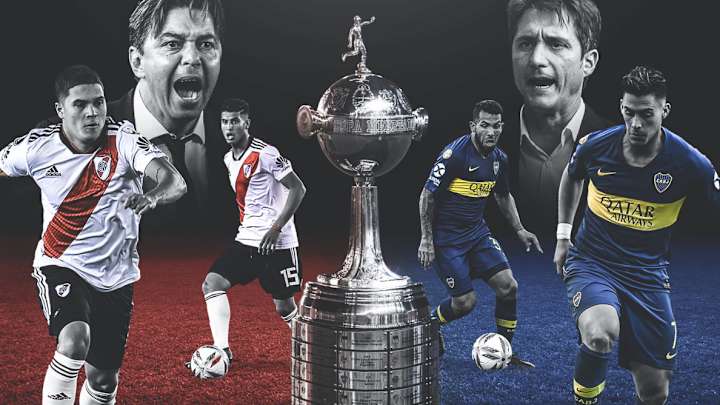Boca Juniors vs. River Plate a Copa Libertadores Final Replete With History

The last time River Plate met Boca Juniors in a Copa Libertadores game, the game was abandoned at halftime after pepper spray was released in the tunnel. The time before that, Carlos Tevez was sent off for pretending to be a chicken. Boca vs. River is one of the world's great rivalries, quite possibly the greatest, a derby that crackles with passion and color and danger, a matchup that drips with history and anecdote. The quality may not quite match that of the Champions League but the sense of occasion, both at La Bombonera on Saturday and in the second leg at El Monumental two weeks later, will be profound.
This will be the last two-legged Libertadores final, and there could hardly be a more fitting one–although it does highlight certainly logistical issues. Away fans have been banned, which is reasonable enough: it was only in August that a five-year restriction on away fans in Argentinian league football was lifted, and only for certain smaller clubs. But you do wonder what will happen next year in Santiago, Chile, where the Estadio Nacional will host a single-legged final, if two major rivals are drawn against each other again.
Yet problematic as it may be, this matchup is a rebuke to the Super League plans Europe’s top clubs have reportedly been discussing, as revealed by Football Leaks over the past week. Boca vs. River in a major final, the first time they have ever met in the final of the Libertadores after 58 years of the competition, is a spectacle that has drawn the eyes of the world. Boca has reported more than 2,500 requests for accreditation from international media. It is not manufactured; it is organic. The game, in truth, will not be of a particularly high technical standard, but that matters less than the fact that people care.
Eagerly anticipated as the game is, though, there is a serious question as to whether it really should be River playing Boca in the final. In the last-16 tie against Racing, River fielded Bruno Zuculini, not realizing he still had a game to serve of a suspension incurred while at Racing in 2013, before he moved to Manchester City. That would usually mean an automatic 3-0 walkover defeat, but Racing failed to submit an appeal within the mandated 24-hour window, and so River got away with it.
Then, in the semifinal against Gremio, River’s coach Marcelo Gallardo was banned from the touchline for the second leg after sending his team back onto the pitch for the second half of the first leg (punctuality has become a recent obsession in South American football, partly because certain managers were taking liberties, but mainly because television companies like to know when games will finish).
That should mean a complete prohibition on coaching during the game, but Gallardo communicated with the bench using a radio and, having disguised himself by turning up the collar on his jacket and pulled down his baseball cap, entered the dressing room at halftime. Even then, Gremio seemed to be cruising to victory, leading 1-0 in the second leg having won the first leg in Argentina 1-0. But Rafael Borre header after 81 minutes followed by a highly controversial 94th-minute VAR-assisted penalty from Pity Martinez gave River an implausible away-goals win.
Gremio appealed, noting Danubio had been handed a 3-0 walkover defeat for a similar incident in the Uruguayan league last year, but CONMEBOL chose merely to ban Gallardo for three further games and fine him $50,000.
Which side enters the Superclasico showdown in the Copa Libertadores final in better form? @golazoargentino joins this week's Planet Fútbol TV to break it all down.
— SI Soccer (@si_soccer) November 8, 2018
For more, watch with a FREE SI TV trial here: https://t.co/lMnzss7qwX pic.twitter.com/4ULRHznaRW
And River could win a second Libertadores in three years; it was awarded the game after the pepper spray incident in 2015 and went on to win the competition. After years of being mocked as “las gallinas,” the chickens, for the way it threw away promising positions–the nickname stems specifically from 1966 when a Banfield fan threw a live chicken onto the pitch to taunt River after it had squandered a 2-0 lead to lose to Penarol in a Libertadores final playoff–this River is finding ways to win.
It was the gallinas nickname, of course, that Tevez was referencing after scoring what seemed like a late winner in the 2004 semifinal. River, having had a man sent off and suffered an injury having used all three substitutes was down to nine men at that point, and had also had its coach and two assistants dismissed. But Tevez was also red-carded, River equalized and the game went into injury time, Boca eventually winning on penalties.
Boca then lost to Once Caldas in the final, but it is the nature of the Superclasico that the semifinal is far better remembered than the final.
Tevez, now 34, is back at Boca, while back then Gallardo was a River midfielder, who missed the second leg because he had been sent off in the first. Saturday’s first leg is replete with history.

An accomplished author of multiple books, Jonathan Wilson is one of the world’s preeminent minds on soccer tactics and history.